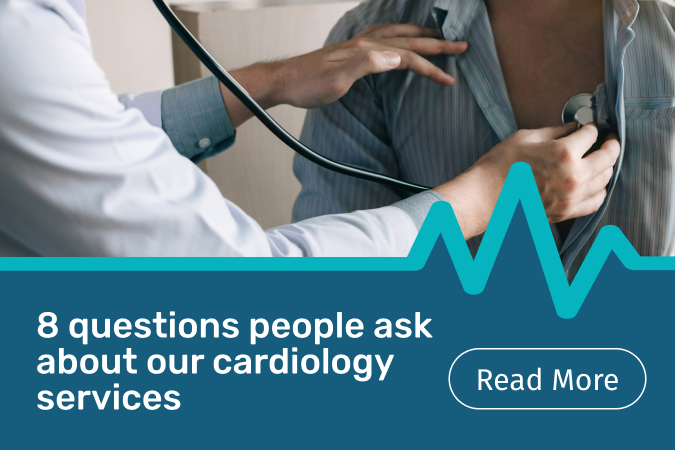
Cardiac Services
We're proud to offer the community access to our cardiac care services at Nepean Private Hospital. We started providing these services in 2016 after recognising the need for private interventional cardiology services in the area. We're the only non-public hospital in the area that offers these services, and our cardiologists are highly experienced with minimal wait times for patients.
Our services include diagnostic and interventional cardiology, diagnostic and interventional electrophysiology, inpatient heart failure management, and diagnostic and pre-surgical ultrasound imaging. We also have great referral networks for cardiothoracic services, radiologic diagnostic imaging CTCA, and cardiac rehab.
Our team perform a range of procedures using state-of-the-art equipment and the latest technology in our hybrid theatre, all supported by our coronary and intensive care units. We're committed to providing expert cardiac care services, so if you need a cardiologist, ask your GP to refer you to a specialist at Nepean Private Hospital.
The private experience
Expect better when you’re with us. Your private patient comfort includes:
- Specialist of your choice
- Accommodation mainly in single rooms with ensuite
- Private dining menu
Next steps
If your GP has recommended more complex cardiac care, ask for a referral to one of the state’s leading specialists. Tell them that you prefer to be treated at Nepean Private Hospital, the heart of cardiac care.

Our world class cardiologists and cardiothoracic surgeons treat a range of heart conditions and related symptoms.
If you are experiencing any of the symptoms listed below:
- Chest pain/Angina
- Palpitations- racing or irregular heartbeat.
- Shortness of Breath
- Dizziness or fainting
- Signs of heart failure – swollen ankles, unable to lie flat or waking short of breath
You should contact your GP or present to our emergency department for assessment.
If you require urgent attention dial 000 (triple zero) and ask for an Ambulance.
Procedures we offer:
Coronary angiography is the process of taking images of the coronary “heart” arteries by passing a thin tube called a catheter through an arm and leg artery to the top of the heart. A small amount of contrast is injected and an x-ray camera outside the body takes images.
Coronary angioplasty and stenting are procedures to reopen blocked or significantly narrowed coronary arteries. This may involve inflating a balloon or placing a stent (an expandable metal scaffold) into the artery to restore blood flow.
Angiography and stenting are commonly performed under local anaesthetic and IV sedation without the need for a general anaesthetic.
Permanent pacemakers, defibrillators and resynchronisation devices.
A pacemaker is a small device usually inserted under the skin of the upper chest and attached to a pacing wire that paces your heart when your heart is unable to do so adequately. This procedure is commonly performed under local anaesthetic without the need for a general anaesthetic.
Electrophysiology (EP) studies, are a series of tests that examine your heart's electrical activity. They involve mapping the electrical paths in the heart to determine if significant electrical abnormalities exist. This may be carried out prior to considering the best management for heart arrhythmias.
Cardiac ablation uses heat (radiofrequency) energy to create tiny scars in your heart to block abnormal electrical signals that cause rhythm disturbances. This procedure is used to correct heart rhythm problems such as atrial fibrillation.
DC cardioversion (DCCV) is used to treat irregular heart rhythms - commonly atrial fibrillation. The procedure involves a general anaesthetic and placement of electrodes on the chest. An electrical impulse or shock is delivered to return the heart rhythm to normal.
A transesophageal echocardiogram is a type of echocardiogram (heart ultrasound) that takes images from behind the heart. This is achieved by passing the probe down the back of the throat (very similar to an endoscopy or gastroscopy procedure). The images obtained are of better quality than a normal echocardiogram due to the lack of lung (air) between echo probe and heart.
An implantable loop recorder is a convenient and easy way to obtain long term ECG recording by implanting a tiny paperclip sized device under the skin. This device can record ECGs for 3 plus years and is generally suited for patients with unexplained fainting and strokes/ministrokes of unknown cause. Your doctor can remotely monitor your heart rhythm via a mobile link that you keep in your home.



